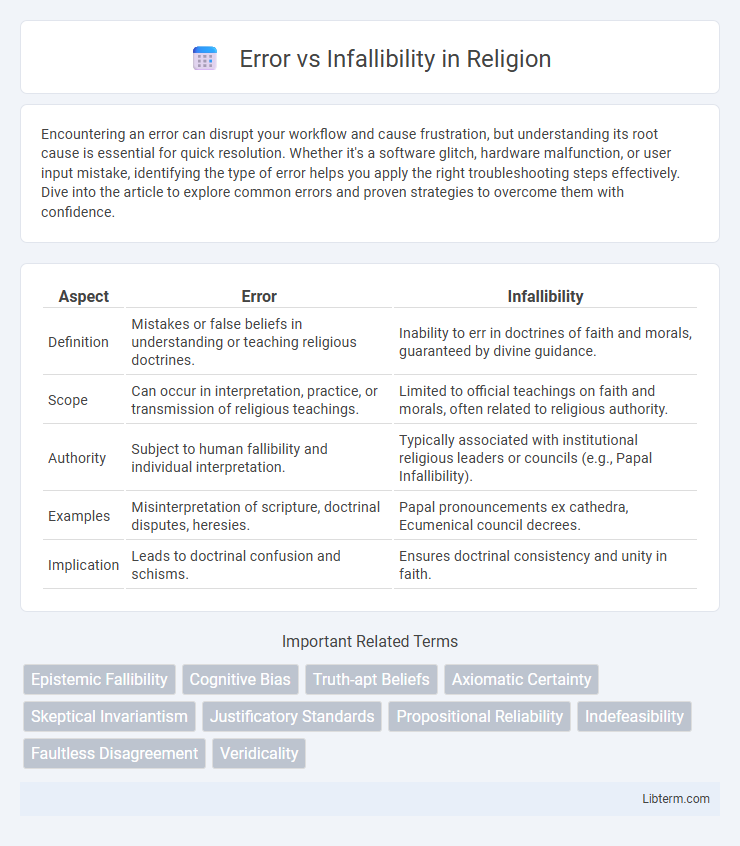Encountering an error can disrupt your workflow and cause frustration, but understanding its root cause is essential for quick resolution. Whether it's a software glitch, hardware malfunction, or user input mistake, identifying the type of error helps you apply the right troubleshooting steps effectively. Dive into the article to explore common errors and proven strategies to overcome them with confidence.
Table of Comparison
| Aspect | Error | Infallibility |
|---|---|---|
| Definition | Mistakes or false beliefs in understanding or teaching religious doctrines. | Inability to err in doctrines of faith and morals, guaranteed by divine guidance. |
| Scope | Can occur in interpretation, practice, or transmission of religious teachings. | Limited to official teachings on faith and morals, often related to religious authority. |
| Authority | Subject to human fallibility and individual interpretation. | Typically associated with institutional religious leaders or councils (e.g., Papal Infallibility). |
| Examples | Misinterpretation of scripture, doctrinal disputes, heresies. | Papal pronouncements ex cathedra, Ecumenical council decrees. |
| Implication | Leads to doctrinal confusion and schisms. | Ensures doctrinal consistency and unity in faith. |
Understanding Error and Infallibility
Error represents the deviation from accuracy, often caused by lack of knowledge, misinterpretation, or faulty reasoning, while infallibility denotes an absolute immunity from error, typically attributed to authoritative sources or flawless systems. Understanding error involves recognizing its origins in human limitations and cognitive biases, whereas understanding infallibility requires assessing the conditions under which a claim or entity is considered incapable of mistake. Differentiating these concepts sharpens critical thinking and supports rigorous evaluation of truth claims in scientific, philosophical, and everyday contexts.
Definitions: What Is Error?
Error refers to a deviation from accuracy or correctness in judgment, action, or measurement, often caused by misinformation, misinterpretation, or faulty reasoning. It signifies a failure to achieve intended outcomes or adhere to established standards, resulting in false conclusions or flawed decisions. Understanding error involves identifying its sources, such as cognitive biases, technical faults, or incomplete information, which distinguishes it from infallibility, the state of being incapable of error.
Defining Infallibility: Myth or Reality?
Infallibility refers to the state of being incapable of making errors, a concept often debated in philosophical and theological contexts where some claim certain authorities or texts possess this trait. Scientific scrutiny challenges infallibility, highlighting that all human knowledge and institutions are prone to mistakes and revisions over time. Understanding infallibility as a myth underscores the importance of critical thinking and continuous verification to approach truth more accurately.
Sources and Causes of Error
Errors primarily arise from cognitive biases, misinformation, sensory limitations, and environmental factors influencing perception and decision-making processes. Human fallibility stems from neurological constraints, emotional interference, and lack of complete information, contrasting with the concept of infallibility, which implies an impossible state of making no mistakes. Systematic errors often originate from flawed methodologies, assumptions, or technological limitations, highlighting the intrinsic distinctions between error sources and absolute accuracy.
Historical Perspectives on Infallibility
Historical perspectives on infallibility often highlight its theological roots, particularly within the Roman Catholic Church, where papal infallibility was formally defined during the First Vatican Council in 1870. This doctrine asserts that the pope, when speaking ex cathedra on matters of faith and morals, is preserved from error, distinguishing it sharply from human fallibility. The concept evolved to address challenges in authority and doctrine, emphasizing divine guidance over human fallibility in ecclesiastical pronouncements.
Error in Human Judgment and Decision Making
Error in human judgment and decision making occurs due to cognitive biases, limited information processing, and emotional influences that distort objective evaluation. These errors can lead to flawed conclusions, poor choices, and unintended consequences in personal and professional contexts. Understanding common sources of error, such as confirmation bias and overconfidence, helps improve decision-making accuracy by promoting critical thinking and evidence-based reasoning.
Infallibility in Science and Religion
Infallibility in science is often viewed as a provisional ideal, as scientific knowledge continually evolves through empirical testing and peer review, allowing for corrections and improvements over time. In contrast, infallibility in religion is typically associated with divine authority and sacred texts considered free from error, providing unwavering moral and spiritual guidance to followers. The distinction highlights that while scientific infallibility is tentative and subject to revision, religious infallibility claims absolute truth based on faith and doctrinal consistency.
Practical Consequences of Error and Infallibility
Errors in decision-making can lead to tangible financial losses, reduced productivity, and damage to organizational reputation, which underscores the practical need for error detection and correction mechanisms. Infallibility, while theoretically ideal, is practically unattainable, but striving for high accuracy minimizes costly mistakes and enhances trust in systems and individuals. Implementing quality control, continuous training, and robust verification processes significantly reduces errors, thereby improving outcomes and operational efficiency across industries.
Can Infallibility Ever Be Achieved?
Infallibility, defined as the absolute inability to err, remains an ideal rarely attainable due to human limitations and contextual complexities. Empirical evidence from cognitive science highlights that even expert decisions are prone to errors influenced by biases, incomplete information, and changing environments. Technological advancements in artificial intelligence aim to reduce errors but cannot guarantee infallibility since uncertainties and unpredictable variables persist in real-world applications.
Embracing Error: Pathway to Growth
Embracing error fosters resilience and accelerates personal and professional growth by transforming mistakes into valuable learning experiences. Recognizing that infallibility is unrealistic encourages experimentation and innovation, enabling individuals to adapt and improve continuously. Prioritizing a growth mindset over perfectionism empowers progress through reflection and constructive feedback.
Error Infographic

 libterm.com
libterm.com